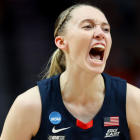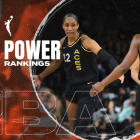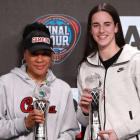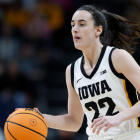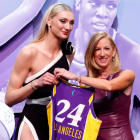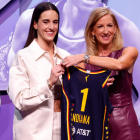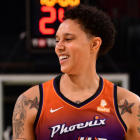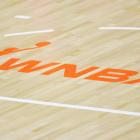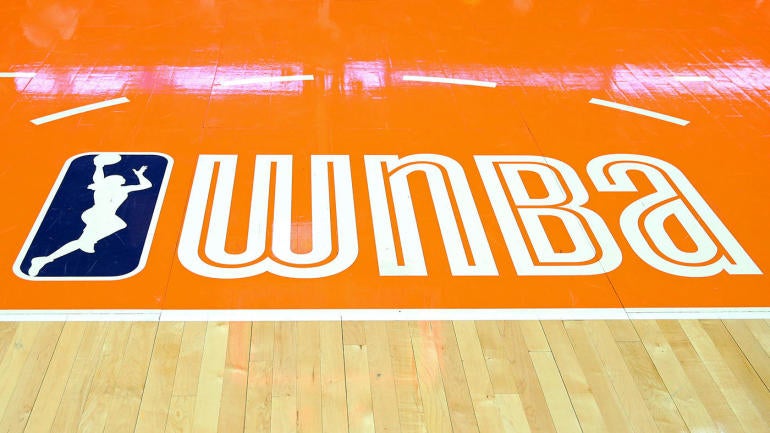
How do you prepare for your rookie season when you don't have access to a gym? For Lauren Cox of the Indiana Fever, you go outside to your driveway to shoot on a hoop so beaten down by the elements that you only count swishes.
"You have to get creative with your workouts," Cox, the No. 3 pick in the WNBA Draft, told CBS Sports. "And it's hard shooting on an outside goal 'cause of things like wind, sunshine. We have one out front. It's not the best. It has to be a perfect swish for it to count I guess, because the rim is really soft so if you hit any part of the rim then the ball is gonna go in, and you're like 'OK, that doesn't really count.'"
While Cox's situation isn't ideal, at least she has access to a hoop, which is not something everyone in the league can say. Minnesota Lynx head coach Cheryl Reeve said that, for some teams, half the players don't have a basket to shoot on.
WNBA players and coaches are used to making do with less than their NBA counterparts, but this situation is a new one. While details surrounding the 2020 WNBA season are still murky, professional basketball seems on track to return to the United States sometime this summer, so teams have had to prepare as if the call could come at any time.
"It's a unique challenge," New York Liberty head coach Walt Hopkins said. "It's not one that's untenable, but we spend a lot of time trying to be creative, trying to do things that are authentic, because it's so easy to fall into the trap of doing stuff that's kind of corny for professional athletes."
Getting to know new teammates, establishing chemistry and learning a playbook is tricky when you're not allowed to be in the same place. The same goes for skill development and maintaining strength and conditioning. Working remotely means something different for a basketball team than it does for a normal business, and implementing a team culture can't possibly be the same in Zoom meetings as it is in a gym.
"It's just weird that we have to do everything virtually," Cox said. "It's kind of hard to get to know someone when you're just staring at a computer screen with their face on it. So that's definitely been the hardest part, just getting to know my teammates. I think it will be better once we get together in person."
For rookies like Cox, this situation is particularly complex. Not only are they trying to figure out their place on a new team, but a completely new league and level of basketball, all through that computer screen. Replicating the normal transition process is impossible.
"It's really hard to [get] across to the rookies that the game is different at the pro level than the college level, and there's incredibly different terminology," Connecticut Sun head coach Curt Miller said. "So as we began our Zoom huddles last week there had to be follow-up. So our assistant coaches followed up with the rookies because we knew their heads would be spinning, and then I followed up just to make sure they're OK. But it's not easy. It's not easy integrating players that have never met."
The Sun are getting together on Zoom to do ballhandling drills led by coaches, and practice yoga. Meanwhile, the Sparks are going as far as attempting virtual practices to try and get a step ahead. On an individual level, strength and conditioning coaches around the league have been sending players personalized workout plans based on the equipment and space they have available.
Even across teams, players have found ways to stick together through a difficult time.
"One cool thing about the W is we're definitely a sisterhood," Connecticut Sun guard Jasmine Thomas said. "We're extremely competitive, but we want to see everybody do well. I think through social media is probably the best way for a lot of us who aren't necessarily friends, but definitely respect each other and keep in touch. When you're posting workouts, or posting meals, or a big thing that's going around right now is if it's not the Peloton bike it's riding the bike outside. There are several of us who have hopped on our bike and got some miles in and (we) post to each other. I've noticed a lot of that and it's been nice to see."
In terms of thinking and understanding the game, some of the options are more obvious, such as watching film, discussing plays and team philosophy and holding breakout meetings by positions. While the exact plan varies, every team is doing something along these lines.
Many of those conversations would happen off the court anyway, and it's easy for coaches to send players individualized film to study. While this isn't a situation anyone wants, some rookies have actually enjoyed the extra time to prepare.
"Obviously the offseason is the time where everybody is looking to grow and develop and expand their game, but obviously that's not really possible in this moment in time," No. 10 overall pick Jocelyn Willoughby of the Liberty said. "So doing everything you can to stay sharp and ready, but sometimes that also means just reframing it. Like you may not be able to do everything physically, but you can watch more film. You can start to learn the plays and terminology."
"I think it's better this way," Crystal Dangerfield, a second-round pick of the Minnesota Lynx added. "You know, compared [to getting] drafted and go[ing] straight into training camp and try[ing] to figure it out that way. This is more of a process where you can take it day by day and week by week and it's not so rushed."
In a pandemic, you take silver linings wherever you can get them. The women's basketball calendar is an intense, 12-month cycle. Between the WNBA season and overseas commitments, many players go years without a real break, putting a strain on their minds, bodies and relationships. Now they have a rare chance to rest, recover and spend time with their families.
"Right now, we should be right in the middle of training camp getting ready for our first game," Dallas Wings head coach Brian Agler said in mid-May. "But I think this is the first time since 2003 that I'll be home for Mother's Day. That's a change, and it's a good thing."
"Everybody's been kind of talking about the silver linings of the pandemic," Thomas said. "The things we're doing for our body right now, whether it's rest, or getting back to basics. One of the things that WNBA players don't have, especially if you're playing year-round, is you don't have time to fine-tune your body. You don't get to lift super heavy, you don't get to really work on those things you'd get to do if you had an offseason. I definitely know for sure that some of us have been taking advantage of that."
But for as much as everyone involved has been doing their best to stay productive and make the best of this quarantine, the situation is taking its toll. The players are stuck in a state of purgatory, preparing endlessly for a season that may begin shortly, or perhaps never at all.
"You're just in a state of wanting a decision," Thomas said. "Whatever it looks like, whatever comes our way, however we're gonna have to play, we just want to know and prepare ourselves."
And that's just for the ones who were lucky enough to make a team. Earlier this week, organizations had to submit their final rosters, despite the fact that they've still not had a training camp.
A number of notable foreign players won't be coming over this year, including Sparks center Maria Vadeeva and Liberty guard Marine Johannes -- they'll technically be suspended for the season -- and dozens of rookies and camp invitees were cut without ever getting to step foot on the court. There's no way around it; that's a brutal situation for coaches and players, and some careers may never recover.
"As you get older you get to be a master at compartmentalization," Reeve said. "I think for me I don't think about what we would be doing right now, or what we don't have, I guess I have this mindset of focusing on what's in front of me, and what's reality, and just dealing with it. I don't know if it's healthy or not, but I don't let myself feel that difficulty. I just focus on being the best I can be for the players, but it's hard, it's really hard. It's hard for everybody."















